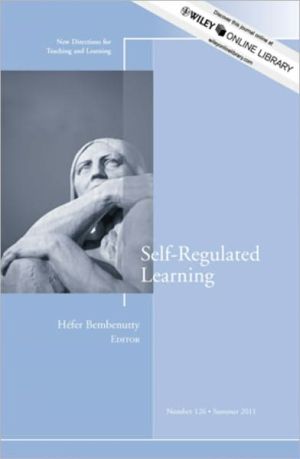

 |

|

Sold Out
Book Categories |
Foreword (Wilbert J. McKeachie).
1. Introduction: Self-Regulation of Learning in Postsecondary Education (Héfer Bembenutty)
The chapter introduces this volume on self-regulation of learning and highlights the current trends on self-regulation presented by each of the authors.
2. Purpose of Engagement in Academic Self-Regulation (Einat Lichtinger, Avi Kaplan)
This chapter argues that self-regulated learning is not a unitary construct, with students’ different purposes of engagement in the task meaningfully distinguishing between different types of self-regulation.
3. Self-Regulation and Achievement Goals in the College Classroom (Akane Zusho, Kelcey Edwards)
This chapter links self-regulation of learning with achievement goal theory and offers practical tips to educators who struggle with disinterested learners.
4. Understanding and Facilitating Self-Regulated Help Seeking (Stuart A. Karabenick, Myron H. Dembo)
The authors describe interventions to develop the competencies and resources that facilitate student help seeking as an effective selfregulated learning strategy.
5. Self-Regulation and Learning Strategies (Claire Ellen Weinstein, Taylor W. Acee, JaeHak Jung)
This chapter reviews research on learning strategies, describes a model of strategic and self-regulated learning, and reports on instructional methods, interventions, and assessments that instructors can use to help students develop lifelong learning strategies they need to succeed in college.
6. Academic Delay of Gratifi cation and Academic Achievement (Héfer Bembenutty)
This chapter provides a review of research on delay of gratifi cation and suggests ways in which educators can instill in students to delay gratifi cation.
7. Resistance and Disidentifi cation in Refl ective Practice with Preservice Teaching Interns (Michael Middleton, Eleanor Abrams, Jayson Seaman)
This chapter examines case studies to identify contextual factors in teacher education programs that promote or inhibit teaching interns' self-refl ective practices.
8. Professional Development Needs and Practices Among Educators and School Psychologists (Timothy J. Cleary)
This chapter summarizes research illustrating the importance and need for motivation and self-regulation professional development training for teachers and school psychologists across assessment, intervention, and instructional activities.
9. Transitioning from College Classroom to Teaching Career: Self-Regulation in Prospective Teachers (Judi Randi, Lyn Corno, Elisabeth Johnson)
This chapter explores how preservice teachers prepare for the transition from college classroom to career through assignments and features of the learning environment designed to approximate the demands of work settings and job-related tasks.
10. The Role of Web 2.0 Technologies in Self-Regulated Learning (Anastasia Kitsantas, Nada Dabbagh)
This chapter demonstrates how Web 2.0 technologies can be used to facilitate self-regulated learning in postsecondary education. The authors show how instructors can integrate social software into course design to promote students’ self-regulation of learning.
11. Self-Regulation of Learning with Computer-Based Learning Environments (Jeffrey A. Greene, Daniel C. Moos, Roger Azevedo)
This chapter outlines how self-regulated learning skills can facilitate learning with computer-based learning environments and how educators can diagnose and build on students' self-regulated learning ability.
12. New Directions for Self-Regulation of Learning in Postsecondary Education (Héfer Bembenutty)
This chapter puts into context the major contributions of this volume on self-regulation of learning and provides new directions for its promotion in postsecondary education.
INDEX.
Login|Complaints|Blog|Games|Digital Media|Souls|Obituary|Contact Us|FAQ
CAN'T FIND WHAT YOU'RE LOOKING FOR? CLICK HERE!!! X
 You must be logged in to add to WishlistX
 This item is in your Wish ListX
 This item is in your CollectionSelf-Regulated Learning, No. 126 2011
X
 This Item is in Your InventorySelf-Regulated Learning, No. 126 2011
X
 You must be logged in to review the productsX
 X
 X

Add Self-Regulated Learning, No. 126 2011, This volume reports new findings associating students' self-regulation of learning with their academic achievement, motivation for learning, and use of cognitive and learning strategies. Self-regulation of learning is a hallmark of students' ability to re, Self-Regulated Learning, No. 126 2011 to the inventory that you are selling on WonderClubX
 X

Add Self-Regulated Learning, No. 126 2011, This volume reports new findings associating students' self-regulation of learning with their academic achievement, motivation for learning, and use of cognitive and learning strategies. Self-regulation of learning is a hallmark of students' ability to re, Self-Regulated Learning, No. 126 2011 to your collection on WonderClub |